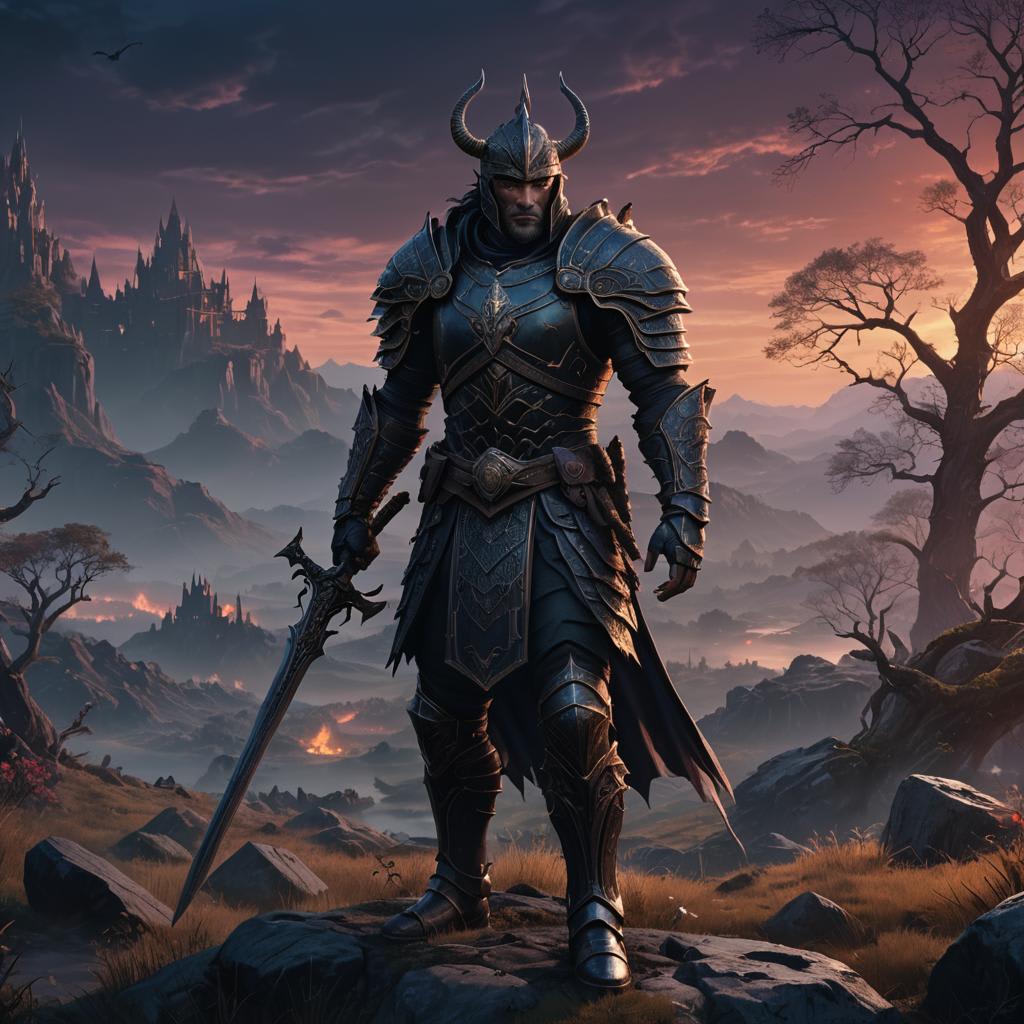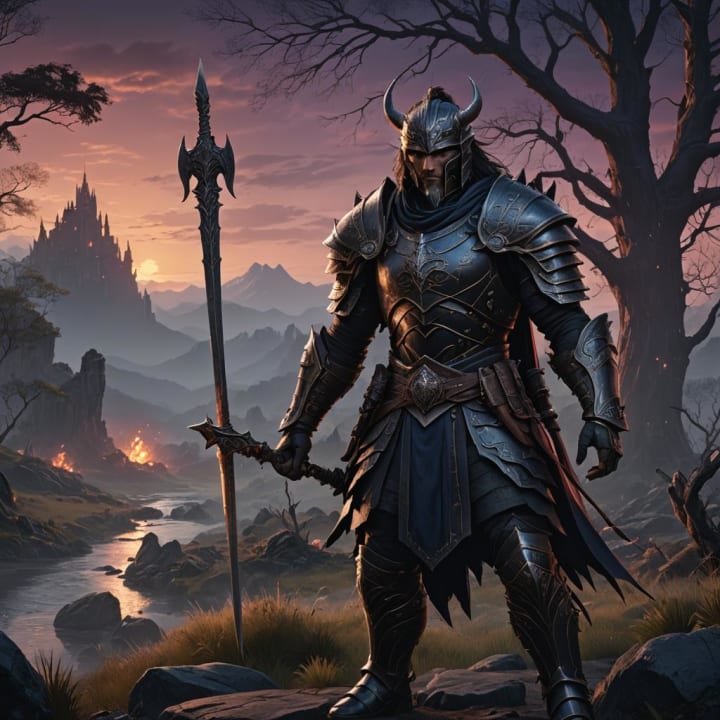Exploring Moral Ambiguity in Grimdark Fantasy: Shades of Grey in Character Development
A Grimdark/Dark Fantasy Blog Post

In the shadowed realms of Grimdark Fantasy, moral certainties dissolve into murky depths where protagonists teeter on the edge of light and darkness. Defined by its gritty realism and grim portrayals, this subgenre challenges traditional notions of heroism and invites readers to wander through a labyrinth of ethical ambiguity. As we navigate this treacherous terrain, we find ourselves confronted with characters who defy conventional morality, existing in a realm where shades of gray reign supreme.
Emerging from the crucible of fantasy literature, Grimdark Fantasy has carved out its niche by subverting age-old tropes and reveling in the darker aspects of humanity. From the bleak landscapes envisioned by pioneers like Joe Abercrombie and George R.R. Martin to the intricate webs woven by newer voices such as Anna Smith Spark and Mark Lawrence, this genre has undergone a metamorphosis that resonates with readers seeking complexity beyond traditional narratives. As its popularity skyrockets in literary circles, Grimdark Fantasy is a testament to our enduring fascination with the morally ambiguous and the shades of moral decay that infuse storytelling with an electrifying potency. You can unravel the intricate moral dilemmas woven intricately into the world of Grimdark Fantasy. In this universe, flawed heroes, villains with redeeming qualities, and a blurred line between right and wrong exist.

Examining Moral Ambiguity in Characters
Grimdark Fantasy is renowned for portraying morally complex and grey characters, often eschewing traditional notions of heroes and villains. Within this subgenre, protagonists frequently navigate a moral landscape fraught with shades of grey, where the distinction between good and evil blurs. Characters like Joe Abercrombie’s Logen Ninefingers or George R.R. Martin’s Jaime Lannister exemplify this moral ambiguity, forcing readers to question conventional notions of righteousness. These morally grey characters resonate with audiences as they reflect the imperfect nature of humanity, making them relatable despite their questionable actions.
Antiheroes are prevalent in Grimdark Fantasy, challenging the traditional heroic archetype by embodying characteristics that often contradict virtuous ideals. These flawed protagonists compel readers to acknowledge human nature's and morality's complexities. For instance, Jorg Ancrath from Mark Lawrence's "The Broken Empire" series is a ruthless antihero whose actions blur the lines between heroism and villainy. The impact of these antiheroes on storytelling is profound, offering a fresh perspective that subverts expectations and invites introspection into heroism.
Character development in Grimdark Fantasy thrives on exploring the blurred lines between good and evil. Authors use nuanced character arcs to delve into moral ambiguity, presenting individuals who operate within ethical gray areas. The evolution of characters from one end of the moral spectrum to another challenges readers' perceptions and fosters engagement with intricate storylines. Complex figures like Geralt of Rivia in Andrzej Sapkowski's "The Witcher" series undergo profound transformations that showcase a constant struggle with morality, enhancing the richness and depth of the narrative. This exploration adds layers to character motivations and prompts audiences to contemplate the intricate interplay between light and dark within each individual.

Themes of Betrayal and Redemption
In the realm of Grimdark Fantasy, the theme of betrayal serves as a dark undercurrent that weaves its way through narratives, creating tension and challenging character dynamics. Betrayal is not merely an act but a visceral force that fractures relationships, tests loyalties and reshapes the trajectory of stories. Those they trust most often subjected characters to betrayals, highlighting the fragile nature of alliances in morally grey settings. For instance, in George R.R. Martin's "A Song of Ice and Fire" series, characters like Jon Snow face profound betrayals that shatter their beliefs and redefine their roles within the narrative.
Redemption arcs stand as pillars of hope in worlds tainted by darkness, offering characters a chance at absolution or transformation. However, these arcs distinguish between authentic character growth and convenient plot devices. In Grimdark Fantasy, repentant characters often earn redemption through suffering and sacrifice instead of having it easily given to them. Jorg Ancrath from Mark Lawrence's "The Broken Empire" trilogy exemplifies a complex redemption arc, where his actions straddle the line between genuine change and self-serving motives.
One cannot understate the impact of betrayal and redemption on reader engagement. These intricate webs of deceit and retribution draw readers in, investing them in the fates of characters navigating treacherous moral landscapes. The uncertainty surrounding who will betray whom next keeps audiences on edge, while the possibility of redemption offers glimpses of light amidst pervasive darkness. By entwining these themes with rich character development, Grimdark Fantasy captivates audiences by presenting nuanced dilemmas that test traditional notions of loyalty and forgiveness in unexpected ways.

Deconstructing Power Dynamics
In the realm of Grimdark Fantasy, power dynamics Byare pivotal in shaping the narrative landscape. Authors often intricately weave tales where characters vie for dominance, control, and influence, mirroring the harsh realities of our world. Whether it's political maneuvering among factions or a struggle for magical supremacy, these power struggles add complexity to the storytelling. For example, in George R.R. Martin's "A Song of Ice and Fire" series, the intricate web of power dynamics between noble houses drives the plot and catalyzes moral dilemmas and character development.
One fascinating aspect of deconstructing power dynamics in Grimdark Fantasy is how power can be both a tool for achieving goals and a corrupting force that erodes morals. Characters often face tough decisions when confronting power-hungry adversaries or when presented with opportunities to seize power. The conflict between personal ambition and ethical values enhances the depth of character stories and challenges traditional ideas of heroism. Consider Joe Abercrombie's "The First Law" trilogy, where characters like Glokta navigate a morally grey world where power can be both a means of survival and a path to moral degradation.
Moreover, the authors leverage power dynamics as background noise and a driving force behind narrative tension. The constant shift in power balances keeps readers on edge, unsure who will emerge victorious or morally unscathed. By intertwining personal ambitions with grand-scale conflicts over power, Grimdark Fantasy narratives create a sense of unpredictability and unease that immerses readers in ethically murky waters. For instance, in Mark Lawrence's "The Broken Empire" trilogy, protagonist Jorg Ancrath's relentless pursuit of power blurs the lines between heroism and villainy, challenging readers' perceptions of right and wrong.
Inan interesting essence, by deconstructing power dynamics within Grimdark Fantasy worlds, the authors present a compelling exploration of how individuals navigate authority, ambition, and morality in complex environments. These narratives delve deep into the darker aspects of human nature, showcasing how power can transform even the most virtuous characters into shades of grey. Critical analysis of these nuanced portrayals of power relationships invites readers to confront uncomfortable truths about governance, leadership, and the sacrifices made to pursue influence within these grim and fantastical realms.

Ethical Dilemmas and Choices
In the realm of Grimdark Fantasy, ethical dilemmas are not just narrative devices but fundamental elements that shape characters and plotlines. Characters are often thrust into morally complex situations where choices aren't black and white but a murky shade of gray. Their decisions serve as moral crossroads,many revealing their true nature and challenging traditional notions of heroism or villainy. For instance, in Joe Abercrombie's "The First Law" series, Logan Ninefingers faces numerous ethical quandaries that force him to confront his violent past and question his beliefs about honor and loyalty.
The consequences of these choices ripple through the storyline, affecting not only the immediate outcome but also the growth trajectory of the characters. Whether protagonists succumb to darkness or villains find unexpected redemption, every decision reverberates within the narrative, shaping alliances and betrayals that keep readers on edge. A prime example can be seen in George R.R. Martin's "A Song of Ice and Fire" series, where characters like Jaime Lannister undergo profound transformations based on the ethical choices they make along their treacherous journeys.
Furthermore, the influence of these ethical dilemmas extends beyond individual character arcs to drive the overall progression of the plot. As characters grapple with moral conflicts, their decisions propel the story forward, creating intricate webs of consequences that challenge traditional storytelling tropes. Ethical dilemmas serve as catalysts for conflict escalation or resolution, adding layers of complexity to Grimdark Fantasy narratives that captivate readers and keep them invested in the fates of even the most morally ambiguous characters.

Influence on Reader Perception
The influence of morally complex characters in Grimdark Fantasy extends beyond the pages of the book, leaving a lasting impression on readers' empathy and understanding. When readers encounter characters who exist in shades of grey, it helpfulhallenges their preconceived notions of good and evil, prompting them to consider the complexity of human nature. Characters like Joe Abercrombie's Logen Ninefingers from "The First Law" series or Jorg Ancrath from Mark Lawrence's "The Broken Empire" trilogy are prime examples of individuals whose actions blur the lines between heroism and villainy. Readers grapple with conflicting emotions as they navigate these characters' moral ambiguity, often forming connections that transcend traditional character archetypes.
Ambiguous actions within the context of morality in Grimdark Fantasy provide fertile ground for readers to engage with ethical dilemmas on a deeper level. For instance, when a character makes a morally reprehensible decision that is potentially advantageous for their cause, readers are forced to confront their beliefs about right and wrong. This interplay between what is perceived as ethical versus what is strategically necessary underscores the intricate layers present in Grimdark storytelling. Such narratives compel readers to contemplate the consequences of characters' choices within a framework where morality isn't always black or white but manifests in multifaceted shades of grey.
The importance of challenging reader perceptions through nuanced character development cannot be overstated in Grimdark Fantasy. Authors weave intricate webs of motivations, traumas, and internal conflicts within their characters, provoking readers to delve into the complexities beneath their actions. By presenting morally grey protagonists and antagonists alongside each other, authors invite readers to question established norms and confront uncomfortable truths about human behavior. Readers are compelled to reassess their initial judgments and develop a more profound understanding of how individuals navigate moral landscapes wrought with ambiguity through this exploration and introspection triggered by morally complex characters.
Grimdark Fantasy is a reflective mirror in which readers confront the harsh realities depicted within its narratives and their conceptions of right and wrong. The genre's ability to challenge conventional moral frameworks through flawed yet compelling characters paves the way for thought-provoking discussions on ethics, redemption, power dynamics, and betrayal. As readers immerse themselves in these intricately woven tales filled with moral quandaries and ambiguous choices, they emerge entertained and enriched with a deeper appreciation for the complexities of navigating the grey areas that define our understanding of morality.

Navigating the Grey Areas
Exploring the intricate moral tapestry within Grimdark Fantasy reveals that the genre thrives on its ability to challenge conventional notions of heroism and villainy. The allure of navigating through shades of grey rather than distinct black-and-white distinctions adds a layer of complexity that resonates with readers seeking narratives that mirror the intricacies of real-world ethical dilemmas. As Grimdark Fantasy continues to captivate audiences with its morally ambiguous characters and intricate plotlines, it stands as a testament to the evolution of modern fantasy literature.
The ongoing evolution of moral ambiguity within Grimdark Fantasy reflects changing societal perspectives and serves as a mirror highlighting the multifaceted nature of human morality. By delving into these grey areas, writers and readers are prompted to confront uncomfortable truths about power, betrayal, redemption, and ethical decision-making. Ultimately, as we navigate these murky waters alongside morally complex characters in Grimdark Fantasy, we are compelled to question our perceptions of right and wrong, blurring the lines between heroism and darkness in ways that enrich our understanding of both fictional worlds and our reality.
To get a first look at blog posts, stories, and more, please subscribe to my Substack for news and more. Paid subscribers get all the fun stuff.
About the Creator
Matthew Angelo
I am a traditional and self-published author and content/copywriter. I write in many genres like fantasy, urban fantasy, horror, cyberpunk, grimdark, romance and science fiction.






Comments
There are no comments for this story
Be the first to respond and start the conversation.